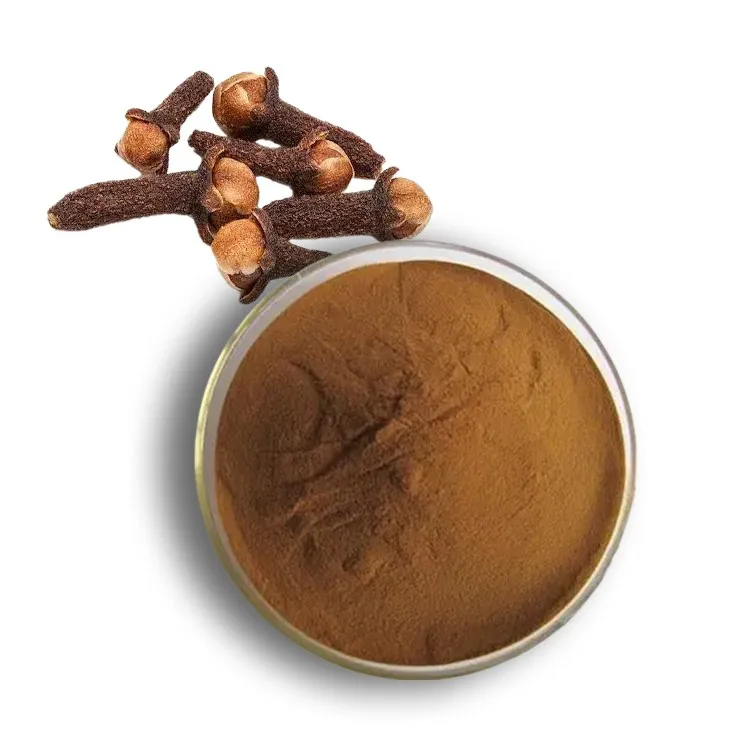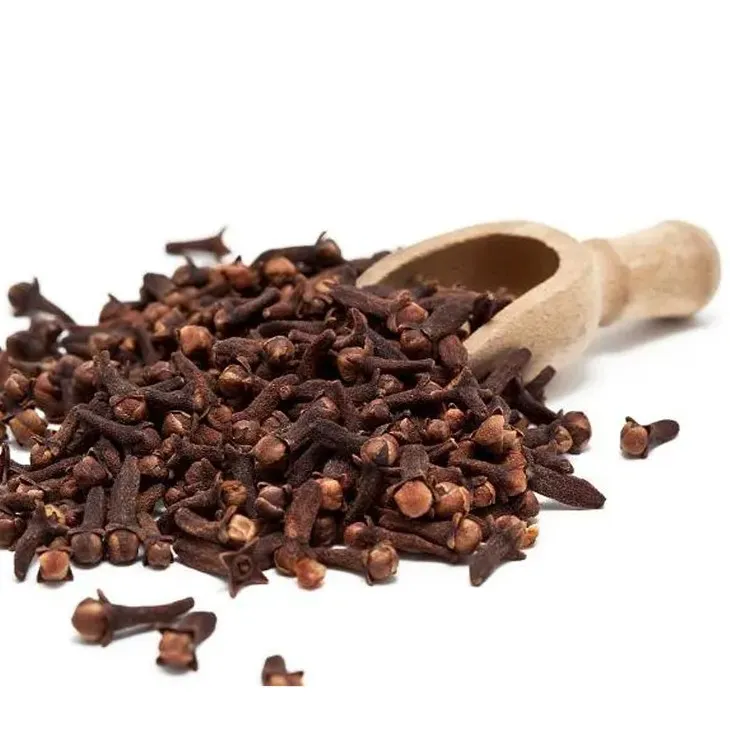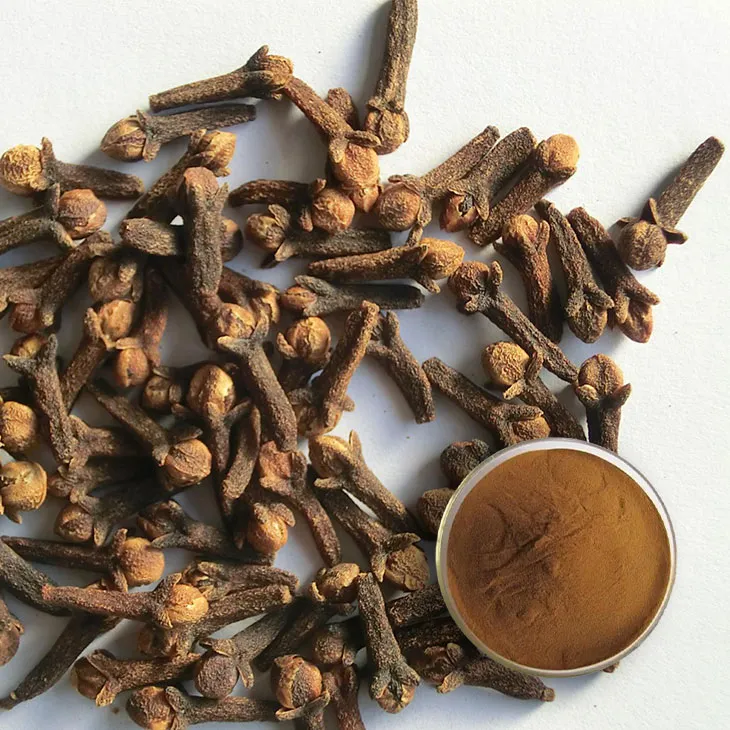- 0086-571-85302990
- sales@greenskybio.com
Clove powder: Uses, advantages, manufacturing processes
2024-11-14

I. Introduction
Dingxiang powder, also known as Clove Powder, is a remarkable substance with a rich history and a wide range of applications. Derived from the dried flower buds of the clove tree (Syzygium aromaticum), this powder has been an important part of various cultures for centuries. Clove trees are native to the Maluku Islands in Indonesia, and the use of cloves and their powder has spread across the globe due to their unique properties.

II. Uses of Clove Powder
A. Culinary Uses
Clove Powder is a popular spice in the culinary world. One of its main uses is in cooking, where it imparts a distinct and rich flavor to a variety of dishes.
In baked goods, such as cakes, cookies, and bread, clove powder adds a warm, spicy note. For example, in a traditional gingerbread recipe, a small amount of clove powder combined with cinnamon and ginger creates a deliciously fragrant and festive flavor. The cloves' unique taste complements the sweetness of the baked items and gives them a more complex flavor profile.
When it comes to stews and braised dishes, clove powder can enhance the overall flavor. It is often used in meat stews, like beef or lamb stew. The spice penetrates the meat during the slow - cooking process, adding depth and a hint of exoticism. In a Moroccan - style lamb tagine, clove powder, along with other spices like cumin, coriander, and turmeric, creates a harmonious blend of flavors that is both savory and aromatic.
Clove powder is also used in pickling. It helps to preserve the food while adding its characteristic flavor. In pickled cucumbers or onions, the addition of clove powder gives a tangy and spicy edge, making the pickles more interesting and flavorful.
B. Medicinal Uses
Clove powder has been recognized for its medicinal properties for a long time. Ancient civilizations such as the Chinese and Ayurvedic traditions in India have used cloves for various health benefits.
It has antibacterial properties. Clove powder contains eugenol, which has been shown to be effective against certain bacteria. This makes it useful in oral health. For example, in some natural toothpaste formulations, clove powder is included to help fight bacteria in the mouth, reduce plaque, and freshen breath.
Clove powder can also act as a pain reliever. Eugenol has a numbing effect, and it has been used topically to relieve toothache pain. In some traditional remedies, a paste made from clove powder and a small amount of water is applied directly to the affected tooth or gum area to ease pain.
It is believed to have anti - inflammatory properties as well. This can be beneficial for conditions where inflammation is a factor, such as in arthritis or certain digestive disorders. Although more research is needed in these areas, the traditional use of clove powder for anti - inflammatory purposes continues.
C. Cosmetic and Aromatherapy Uses
Clove powder is also making its mark in the cosmetic and aromatherapy industries.
In cosmetics, clove powder can be found in some skincare products. Its antibacterial properties make it suitable for acne - prone skin. It may be included in face masks or creams to help keep the skin clean and prevent breakouts. Additionally, the antioxidant properties of cloves can help protect the skin from damage caused by free radicals.
In aromatherapy, the strong aroma of clove powder is used to create a stimulating and invigorating environment. Clove essential oil, which is often derived from the same source as the powder, is used in diffusers. The scent of cloves can help improve concentration, relieve stress, and boost mood. However, it should be used with caution as the strong aroma can be overpowering in large amounts.

III. Advantages of Clove Powder
A. Strong Aroma
The strong aroma of clove powder is one of its most notable advantages. This aroma is a result of the various chemical compounds present in cloves, with eugenol being a major contributor.
The strong scent makes it a very effective spice in cooking. Even a small amount can add a significant amount of flavor to a dish. In a large pot of stew or a big batch of baked goods, a teaspoon or less of clove powder can be enough to impart its characteristic taste.
In aromatherapy, the intense aroma of clove powder (or its essential oil) can quickly fill a room. This makes it a popular choice for creating a specific atmosphere. For example, in a small study or workspace, using a diffuser with a few drops of clove essential oil can create an environment that is both stimulating and pleasant.
B. Medicinal Properties
As mentioned earlier, the medicinal properties of clove powder are a great advantage.
The antibacterial properties are not only useful in oral health but also in general wound care. In some traditional medicine practices, a poultice made from clove powder has been used to treat minor cuts and infections. The eugenol in the powder can help prevent the growth of harmful bacteria, promoting faster healing.
The pain - relieving properties of clove powder can be a natural alternative to over - the - counter pain medications in some cases. For those who prefer natural remedies or who may have sensitivities to synthetic drugs, clove powder can be a valuable option for managing mild pain, especially dental pain.
The potential anti - inflammatory effects of clove powder can contribute to overall health. Chronic inflammation is associated with many diseases, and if clove powder can help reduce inflammation, it could have a positive impact on conditions such as heart disease, diabetes, and certain autoimmune disorders, although more research is required to fully understand its role in these complex health issues.
C. Long Shelf Life
Clove powder has a long shelf life, which is another advantage.
When stored properly in a cool, dry place, clove powder can retain its flavor and potency for a long time. This makes it a convenient ingredient to have in the pantry. Unlike some fresh herbs or perishable spices, it does not spoil quickly. For example, a jar of clove powder can last for several months or even years without losing its quality, as long as it is kept sealed and away from moisture and heat.
Its long shelf life also makes it suitable for commercial products. Manufacturers of food products, cosmetics, and medicinal preparations can stockpile clove powder without worrying about it deteriorating quickly. This helps in ensuring a consistent supply of products that contain clove powder as an ingredient.

IV. Manufacturing Processes of Clove Powder
A. Harvesting
The process of manufacturing clove powder begins with harvesting the clove flower buds.
Clove trees typically start producing flower buds when they are about 4 - 5 years old. The buds are harvested at the right stage of development, which is usually when they are pinkish - red in color and have not yet fully opened. This is crucial as the quality of the cloves, and ultimately the powder, depends on the stage of harvesting.
Harvesting is usually done by hand. Workers carefully pick the buds from the tree branches. This method ensures that only the suitable buds are selected and minimizes damage to the buds. Hand - harvesting is a labor - intensive process, but it is necessary to maintain the high quality of the cloves.
B. Drying
After harvesting, the next step in the manufacturing process is drying the cloves.
The freshly harvested cloves are spread out in a single layer on drying racks or mats. They are usually dried in the sun, which is a natural and cost - effective method. The sun - drying process can take several days, depending on the weather conditions. During this time, the moisture content of the cloves gradually decreases.
In some cases, artificial drying methods may also be used, especially in regions where sunlight is not sufficient or when there is a need to speed up the drying process. Artificial dryers are set to a specific temperature and humidity level to ensure proper drying without damaging the cloves. The ideal drying temperature is usually around 40 - 50°C.
C. Grinding
Once the cloves are dried, they are ready for grinding to produce clove powder.
The dried cloves are first sorted to remove any debris or defective cloves. This ensures that the final powder is of high quality. After sorting, the cloves are placed in a grinder. There are different types of grinders that can be used, such as a mortar and pestle for small - scale production or industrial - grade grinders for large - scale manufacturing.
The grinding process should be carried out carefully to achieve the desired fineness of the powder. If the powder is too coarse, it may not be evenly distributed in recipes or products. On the other hand, if it is too fine, it may clump together. The final product, clove powder, is then stored in airtight containers to preserve its flavor and quality.
V. Conclusion
Clove powder is a versatile and valuable substance with a wide range of uses, numerous advantages, and a relatively straightforward manufacturing process. From its role in adding flavor to culinary delights to its potential health benefits and applications in cosmetics and aromatherapy, clove powder has much to offer. Its strong aroma, medicinal properties, and long shelf life make it a popular choice in various industries. Understanding the manufacturing process, from harvesting to grinding, helps to ensure the quality of the final product. As research continues, we may discover even more potential uses and benefits of this remarkable powder.
FAQ:
What are the main uses of clove powder in cooking?
Clove powder can be used in various ways in cooking. It is often added to baked goods such as cakes and bread, giving them a warm, spicy flavor. In stews, it can enhance the overall flavor profile, adding depth and richness. It is also used in marinades for meats, as it can help tenderize the meat and impart its distinct flavor.
What are the medicinal properties of clove powder?
Clove powder has several medicinal properties. It has antibacterial and antifungal properties, which can be beneficial for oral health. It may also have anti - inflammatory effects and can potentially relieve pain. Additionally, it has been used in traditional medicine to aid digestion and relieve nausea.
How is clove powder manufactured?
The manufacturing process of clove powder mainly involves two steps. First, the cloves are dried thoroughly. This helps to preserve their flavor and aroma. Then, the dried cloves are ground into a fine powder. The powder can be further sieved to ensure a consistent texture.
Can clove powder be used in beverages?
Yes, clove powder can be used in beverages. It is a common ingredient in mulled wine, adding a spicy and warming flavor. It can also be used in some herbal teas, where it may contribute to the taste and potentially offer some of its medicinal benefits.
How should clove powder be stored?
Clove powder should be stored in an airtight container in a cool, dry place. Exposure to air, moisture, and heat can cause the powder to lose its flavor and aroma over time. Storing it properly will help maintain its quality for a longer period.
Related literature
- The Comprehensive Guide to Clove Powder: Properties and Applications"
- "Clove Powder in Culinary and Medicinal Worlds: A Review"
- "Manufacturing and Quality Control of Clove - based Products"
- ▶ Hesperidin
- ▶ Citrus Bioflavonoids
- ▶ Plant Extract
- ▶ lycopene
- ▶ Diosmin
- ▶ Grape seed extract
- ▶ Sea buckthorn Juice Powder
- ▶ Fruit Juice Powder
- ▶ Hops Extract
- ▶ Artichoke Extract
- ▶ Mushroom extract
- ▶ Astaxanthin
- ▶ Green Tea Extract
- ▶ Curcumin
- ▶ Horse Chestnut Extract
- ▶ Other Product
- ▶ Boswellia Serrata Extract
- ▶ Resveratrol
- ▶ Marigold Extract
- ▶ Grape Leaf Extract
- ▶ New Product
- ▶ Aminolevulinic acid
- ▶ Cranberry Extract
- ▶ Red Yeast Rice
- ▶ Red Wine Extract
-
Chasteberry Extract
2024-11-14
-
Eucommia Ulmoides Extract
2024-11-14
-
Selenium yeast
2024-11-14
-
Curcumin
2024-11-14
-
Reishi mushroom extract
2024-11-14
-
Hericium erinaceus extract powder
2024-11-14
-
Pine bark Extract Powder
2024-11-14
-
Dandelion Root Extract
2024-11-14
-
White Peony Extract
2024-11-14
-
Feverfew Extract
2024-11-14





















